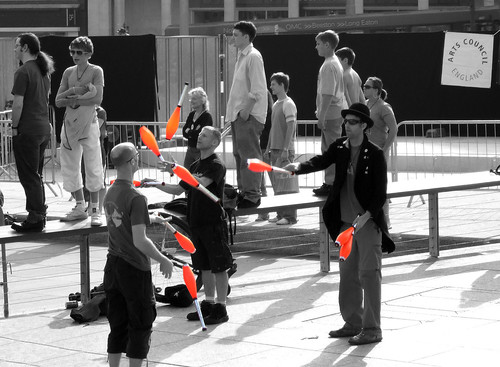
Is juggling several tennis balls while telling a joke multitasking?
Jim McGee pointed back to a /message article by Stowe Boyd from August, The War On Flow, 2009: Why Studies About Multitasking Are Missing The Point. Stowe is referencing yet another study (that I happened to reference recently) on personal multitasking and the impact on the individual.
So, I maintain that studies like this continue to miss the point. If you use industrial era yardsticks based on personal productivity to try to figure out what is going on in our heads, here, in the web of flow, you will simply think we are defective. We'll have to learn how to measure the larger scope -- the first and second closure of our networks -- and distill from our media-based interactions how we influence and support each other. Get away from counting the calories, and get into how it all tastes.
I really like Stowe's perspective here. People who are consuming multiple inputs aren't necessarily trying to get one specific thing done. They are operating in the world, deal with it. The discussion also reminded me of one of the anecdotes of the knowledge management world. Is the woman sitting at her desk and staring out the window being "productive?" All depends on your perspective, right?
The Critical Chain mailing list is discussing (again) this topic, and amongst the variety of topics was the comment that there are different types of multitasking that individuals find themselves doing. A frustration about articles and discussions around multitasking don't clarify what they mean.
Task switching: switching from one active task to another without getting any of them done. This is not switching because the first task hit a stopping point: it's switching for some other reason (like someone called for help on another task), and is generally considered ineffective because nothing gets to a stopping point or a hand off. Nothing gets "done." This is the stuff that project managers worry about the most (and that hamstring most organizations). It looks like "progress" is made in many areas, but nothing ever gets done.
Backgrounding: doing one primary thing while some other things are going on in the background. Listening to music and reading a book. Listening to a podcast and perusing the news. These generally use different parts of the brain and one can argue whether the primary task suffers or not.
And then there is what Stowe Boyd was discussing, it's not really either of these. It's juggling: a bunch of activities that come together for a larger purpose. He talks about doing many different things over time that keep him connected to the world in which he operates and gives him fodder for thoughts that might gel today or next week. It's research. Classic "knowledge worker" activity. Self-directed and oriented towards goals that aren't so hard and fast.
[Photo: "Club Juggling" by GraphicReality.]